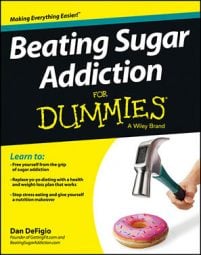Gluten is a plant protein found in wheat, rye, and barley. People trying to reduce their carbohydrate intake often also attempt to reduce gluten consumption because eliminating gluten can potentially eliminate a lot of junk food from the diet. Some people have a confirmed sensitivity or allergy to gluten and cut it out of their diets to avoid the side effects.
Why are so many people sensitive to gluten? These grains are a relatively new addition to the human diet (only about 10,000 years or so), so some scientists theorize that humans haven’t yet adapted to digesting this type of food. Enough people exhibit a low-grade allergic reaction to gluten that it — along with dairy, nuts, and GMO soy — has become one of the most common allergens of the day.
Gluten sensitivity doesn’t result in anaphylactic shock like some severe food allergies can, but it can cause long-term damage if ignored. Continued consumption of gluten by a gluten-sensitive person can lead to celiac disease (sometimes referred to as celiac sprue), in which gluten damages the intestines, leading to severe nutrient absorption problems and nutritional deficiencies.
Oats don’t contain gluten, but they do contain peptide sequences that are very similar to wheat gluten. Oats often cause symptoms in celiac patients similar to wheat, and so oats are included in the list of foods for gluten-sensitive individuals to avoid.
In addition, though oats themselves are gluten-free, they can be contaminated with gluten from other grains during distribution and processing (most oats are milled and stored in the same facilities as wheat).
Common symptoms of gluten sensitivity are
Bloating, cramping, and flatulence
Chronic fatigue
Diarrhea or constipation
Indigestion
Joint pain
Mouth sores
Skin rashes
Ulcers
Humans don’t need gluten to stay healthy, so some nutritionists suggest that everyone avoid gluten, even those who aren’t exhibiting any symptoms of gluten sensitivity. Because avoiding all gluten can be a difficult lifestyle choice, try eating gluten-free only if you fit any of these criteria:
You have a confirmed gluten sensitivity.
You suffer from an autoimmune disorder like eczema, fibromyalgia, IBS, lupus, or rheumatoid arthritis.
You’ve tried eating gluten-free for a few weeks, and you notice that you feel a lot better if you don’t eat it.
If you’ve been diagnosed with celiac disease or non-celiac gluten sensitivity, removing gluten from your diet is very important. Cheating a little here and there may seem harmless, but it can permanently damage your intestines over time and lead to other serious problems like nutrient malabsorption, osteoporosis, depression, and even intestinal cancer.
Avoiding gluten can be tricky because many common foods have ingredients that may be sources of gluten that aren’t obvious. In addition to eliminating wheat, barley, rye, and oats from your diet, be aware that the following foods often contain gluten:
Beer and distilled spirits
Bouillon cubes
Candy (sometimes dusted with wheat flour)
Canned soups
Cheese spreads or other processed cheese foods (why would you eat this anyway?)
Chocolate (sometimes contains malt flavoring from barley)
Cold cuts and sausages (may have gluten from cereal fillers)
Dip mixes
Dry sauce mixes
Dry-roasted nuts and honey-roasted nuts
French fries or other fried foods in restaurants (often coated with flour)
Gravies — check out thickening agents and liquid base
Instant coffee (a cereal product is sometimes included in the formula)
Lip balms and lipsticks
Many ice creams and frozen yogurt products
Mayonnaise (check ingredients that are used as thickeners)
Precooked hams and turkeys from commercial suppliers (often basted with wheat starch and sugar)
Some toothpastes
Sour cream (may contain modified food starch)

